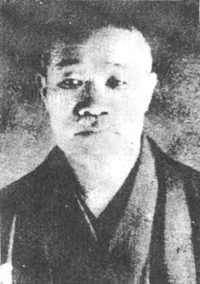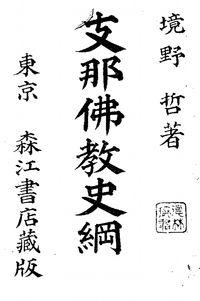Views
m (→Important Works) |
m |
||
| (4 intermediate revisions not shown) | |||
| Line 3: | Line 3: | ||
|names=* Sakaino's given name 哲 is often rendered as Satoshi さとし or Tetsu てつ | |names=* Sakaino's given name 哲 is often rendered as Satoshi さとし or Tetsu てつ | ||
* Also known as Kōyō 黃洋 こうよう | * Also known as Kōyō 黃洋 こうよう | ||
| - | |image= | + | * Originally named 哲海 |
| - | |birth=8/12 Meiji 明治 4 (Sept. 26, 1871) in Natori District 名取郡, Miyagi Prefecture 宮城県 (Present-day Sendai 仙台) | + | |image=[[File:Sakaino_satoru.png|200px|center|Sakaino Satoru 境野哲]] |
| - | |death=November 11, Shōwa 昭和 8 (1933) | + | |birth=8/12 Meiji 明治 4 (Sept. 26, [[1871]]) in Natori District 名取郡, Miyagi Prefecture 宮城県 (Present-day Sendai 仙台) |
| - | |associates= | + | |death=November 11, Shōwa 昭和 8 ([[1933]]) |
| + | |associates=Known Associates: | ||
| + | * Murakami Senshō 村上專精 | ||
| + | * Watanabe Kaikyoku 渡辺海旭 | ||
|editor-name=Gregory Adam Scott | |editor-name=Gregory Adam Scott | ||
}} | }} | ||
'''Sakaino Satoru 境野哲 さかいの・さとる (1871-1933)''' was a prolific Japanese scholar and author of Buddhist history whose works were influential in China. | '''Sakaino Satoru 境野哲 さかいの・さとる (1871-1933)''' was a prolific Japanese scholar and author of Buddhist history whose works were influential in China. | ||
| - | ==Biography== | + | == Biography == |
Sakaino was a priest in the Ōtani sect 大谷派 of the Jōdō Shinshu 真宗 Japanese Buddhist tradition. As a child he read Inoue Enryō 井上圓了 (1858-1919) which sparked an interest in Buddhism, and later in 1894 he was involved with the periodical ''Bukkyō Shirin'' 佛教史林 (''Histories of Buddhism'') published by Murakami Senshō 村上專精 (1851-1929).<ref>For more on these and related figures, see James E. Ketelaar, "The Non-Modern Confronts the Modern: Dating the Buddha in Japan," ''History and Theory'' (Vol. 45, No. 4, Theme Issue 45: Religion and History, Dec., 2006):67-69. On Murakami see [http://ja.wikipedia.org/wiki/%E6%9D%91%E4%B8%8A%E5%B0%82%E7%B2%BE Japanese Wikipedia article on 村上專精]</ref> After studying at Tetsugakukan University 哲学館大學 (present-day Tōyō University 東洋大學) where he majored in Buddhist history, Sakaino lectured at Tetsugakukan and Sōtōshū University 曹洞宗大學 (present-day Komazawa University 駒澤大學). | Sakaino was a priest in the Ōtani sect 大谷派 of the Jōdō Shinshu 真宗 Japanese Buddhist tradition. As a child he read Inoue Enryō 井上圓了 (1858-1919) which sparked an interest in Buddhism, and later in 1894 he was involved with the periodical ''Bukkyō Shirin'' 佛教史林 (''Histories of Buddhism'') published by Murakami Senshō 村上專精 (1851-1929).<ref>For more on these and related figures, see James E. Ketelaar, "The Non-Modern Confronts the Modern: Dating the Buddha in Japan," ''History and Theory'' (Vol. 45, No. 4, Theme Issue 45: Religion and History, Dec., 2006):67-69. On Murakami see [http://ja.wikipedia.org/wiki/%E6%9D%91%E4%B8%8A%E5%B0%82%E7%B2%BE Japanese Wikipedia article on 村上專精]</ref> After studying at Tetsugakukan University 哲学館大學 (present-day Tōyō University 東洋大學) where he majored in Buddhist history, Sakaino lectured at Tetsugakukan and Sōtōshū University 曹洞宗大學 (present-day Komazawa University 駒澤大學). | ||
| - | In [[1900]] he founded the periodical '' | + | In [[1900]] he founded the periodical ''Shinbukkyō'' 新佛教 (''New Buddhism''), which was used as a platform for the ''Shin Bukkyō dōshikai'' 新佛教同志會 (New Buddhist Association) of which he was a member. Other members included Watanabe Kaikyoku 渡辺海旭 (1872-1933) who helped publish the Taishō canon [[大正新修大藏經]], and Takashima Beihō 高嶋米峰 (1875-1949), a scholar of Buddhism. |
{{incomplete}} | {{incomplete}} | ||
| - | ==Important Works== | + | == Important Works == |
[[File:Sakaino_Shina_bukkyo_shiko.png|200px|thumb|right|Cover page from ''Shina bukkyōshi k''ō 支那佛教史綱 (Outline History of Buddhism in China)]] | [[File:Sakaino_Shina_bukkyo_shiko.png|200px|thumb|right|Cover page from ''Shina bukkyōshi k''ō 支那佛教史綱 (Outline History of Buddhism in China)]] | ||
<small>Note: This list uses traditional Sino-Japanese characters for book titles; other references may use the post-1946 ''shinjitai'' 新字體 forms.</small> | <small>Note: This list uses traditional Sino-Japanese characters for book titles; other references may use the post-1946 ''shinjitai'' 新字體 forms.</small> | ||
| Line 29: | Line 32: | ||
** Published with revisions in Chinese as ''Zhōngguó Fójiào shǐ'' [[中國佛教史]]. By Jiǎng Wéiqiáo [[蔣維喬]]. Shànghǎi: Commercial Press 商務印書館, [[1929]]. | ** Published with revisions in Chinese as ''Zhōngguó Fójiào shǐ'' [[中國佛教史]]. By Jiǎng Wéiqiáo [[蔣維喬]]. Shànghǎi: Commercial Press 商務印書館, [[1929]]. | ||
* ''Hasshū kōyō kōwa'' 八宗綱要講話 (Lectures on Essentials of the Eight Schools). 東京: 丙午出版社, [[1916]] | * ''Hasshū kōyō kōwa'' 八宗綱要講話 (Lectures on Essentials of the Eight Schools). 東京: 丙午出版社, [[1916]] | ||
| - | ** This work appeared in translation serialized in the Chéngdū '' | + | ** This work appeared in translation serialized in the Chéngdū periodical ''Fóhuà xúnkān'' [[佛化旬刊(成都)]] from Sept. [[1925]] to May [[1926]] |
* ''Tendai shikyōgi kōwa'' 天台四教儀講話 (Lectures on the ''Outline of the Four Tiantai Teachings''). 東京: 丙午出版社, [[1919]] | * ''Tendai shikyōgi kōwa'' 天台四教儀講話 (Lectures on the ''Outline of the Four Tiantai Teachings''). 東京: 丙午出版社, [[1919]] | ||
* ''Shina Bukkyō shi kowa'' 支那佛教史講話 (A Discussion of the History of Buddhism in China). Tōkyō 東京: 共立社, Shōwa 2 (1927). | * ''Shina Bukkyō shi kowa'' 支那佛教史講話 (A Discussion of the History of Buddhism in China). Tōkyō 東京: 共立社, Shōwa 2 (1927). | ||
| Line 44: | Line 47: | ||
* 中國佛教精史 | * 中國佛教精史 | ||
| - | ==Notes== | + | == Notes == |
<references/> | <references/> | ||
| - | ==References== | + | == References == |
| - | * {{FDC}}, | + | * {{FDC}}, pp. 5767-8. |
* Ketelaar, James E. "The Non-Modern Confronts the Modern: Dating the Buddha in Japan". ''History and Theory'', Vol. 45, no. 4 (Dec., 2006), 68. | * Ketelaar, James E. "The Non-Modern Confronts the Modern: Dating the Buddha in Japan". ''History and Theory'', Vol. 45, no. 4 (Dec., 2006), 68. | ||
* Suganuma Akira. "The New Buddhism Movement and the Educational Idea of the Tetsugakukan--Sakaino Koyo and Takashima Beiho". ''Journal of Indian and Buddhist Studies'', 49.1 (2000) | * Suganuma Akira. "The New Buddhism Movement and the Educational Idea of the Tetsugakukan--Sakaino Koyo and Takashima Beiho". ''Journal of Indian and Buddhist Studies'', 49.1 (2000) | ||
Current revision as of 20:48, 7 December 2014
Sakaino Satoru 境野哲 さかいの・さとる
(1871-1933) |
Known Associates:
|
|
Sakaino Satoru 境野哲 さかいの・さとる (1871-1933) was a prolific Japanese scholar and author of Buddhist history whose works were influential in China.
Contents |
Biography
Sakaino was a priest in the Ōtani sect 大谷派 of the Jōdō Shinshu 真宗 Japanese Buddhist tradition. As a child he read Inoue Enryō 井上圓了 (1858-1919) which sparked an interest in Buddhism, and later in 1894 he was involved with the periodical Bukkyō Shirin 佛教史林 (Histories of Buddhism) published by Murakami Senshō 村上專精 (1851-1929).[1] After studying at Tetsugakukan University 哲学館大學 (present-day Tōyō University 東洋大學) where he majored in Buddhist history, Sakaino lectured at Tetsugakukan and Sōtōshū University 曹洞宗大學 (present-day Komazawa University 駒澤大學).
In 1900 he founded the periodical Shinbukkyō 新佛教 (New Buddhism), which was used as a platform for the Shin Bukkyō dōshikai 新佛教同志會 (New Buddhist Association) of which he was a member. Other members included Watanabe Kaikyoku 渡辺海旭 (1872-1933) who helped publish the Taishō canon 大正新修大藏經, and Takashima Beihō 高嶋米峰 (1875-1949), a scholar of Buddhism.
| This section is incomplete and more content needs to be added. You can help by contributing text, images, or suggestions. |
Important Works
Note: This list uses traditional Sino-Japanese characters for book titles; other references may use the post-1946 shinjitai 新字體 forms.
- Shimbukkyō 新佛教 (New Buddhism) (periodical)
- Nihon bukkyōshi yō 日本佛教史要 (Essential History of Buddhism in Japan). 1901
- Indo bukkyōshi kō 印度佛教史綱 (Outline History of Buddhism in India). 東京: 森江書店, 1905
- Shina bukkyōshi kō 支那佛教史綱 (Outline History of Buddhism in China). 東京: 森江書店, 1907
- Hasshū kōyō kōwa 八宗綱要講話 (Lectures on Essentials of the Eight Schools). 東京: 丙午出版社, 1916
- Tendai shikyōgi kōwa 天台四教儀講話 (Lectures on the Outline of the Four Tiantai Teachings). 東京: 丙午出版社, 1919
- Shina Bukkyō shi kowa 支那佛教史講話 (A Discussion of the History of Buddhism in China). Tōkyō 東京: 共立社, Shōwa 2 (1927).
- "Zui Tō izen no Chūgoku bukkyō" 隋唐以前之中國佛教 (Chinese Buddhism before the Sui-Tang Period). Doctoral Dissertation, Komazawa University 駒澤大學, 1930
- Nihon bukkyōshi kōwa 日本佛教史講話 (Lectures on the History of Buddhism in Japan). 東京: 森江書店, 1931
- Bukkyō kenkyū hō 佛教研究法 (Method of Studying Buddhism). 東京: 大東出版社, 1931
- Bukkyō gaku gairon 佛教學槪論 (General Treatise on Buddhist Studies). 東京: 境野黃洋博士遺稿刊行會, 1936 (Published posthumously)
- 印度中國佛教史要
- 佛教史論
- 聖德太子之研究
- 戒律之研究
- 中國佛教史之研究
- 日本佛教發達概說
- 中國佛教精史
Notes
- ↑ For more on these and related figures, see James E. Ketelaar, "The Non-Modern Confronts the Modern: Dating the Buddha in Japan," History and Theory (Vol. 45, No. 4, Theme Issue 45: Religion and History, Dec., 2006):67-69. On Murakami see Japanese Wikipedia article on 村上專精
References
- Fóguāng Dictionary Editing Committee 佛光大辭典編修委員會, Fóguāng dàcídiǎn 佛光大辭典 (Foguang Dictionary) (Gāoxióng county 高雄縣: Fóguāng chūbǎnshè 佛光出版社, 1988), pp. 5767-8.
- Ketelaar, James E. "The Non-Modern Confronts the Modern: Dating the Buddha in Japan". History and Theory, Vol. 45, no. 4 (Dec., 2006), 68.
- Suganuma Akira. "The New Buddhism Movement and the Educational Idea of the Tetsugakukan--Sakaino Koyo and Takashima Beiho". Journal of Indian and Buddhist Studies, 49.1 (2000)
- Wikipedia (Japanese Edition), Article on 境野哲

